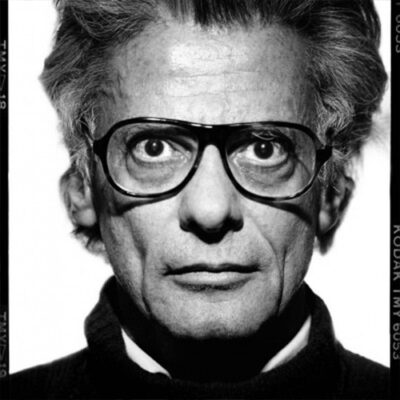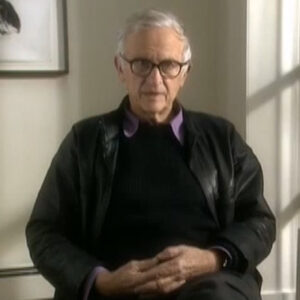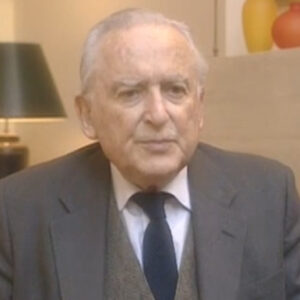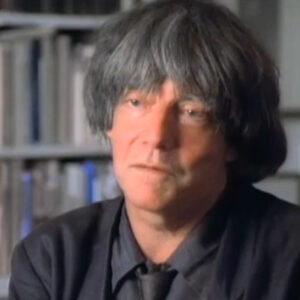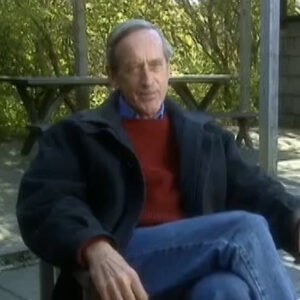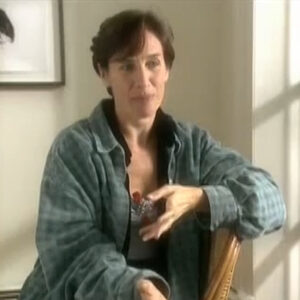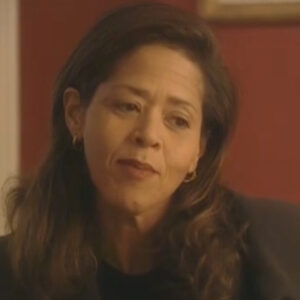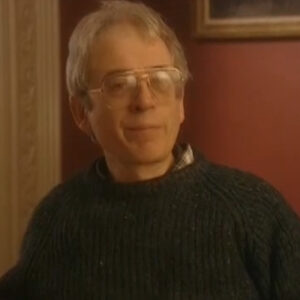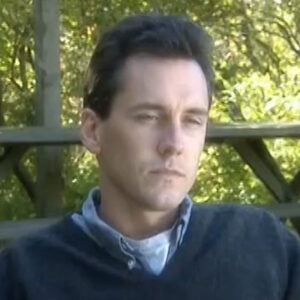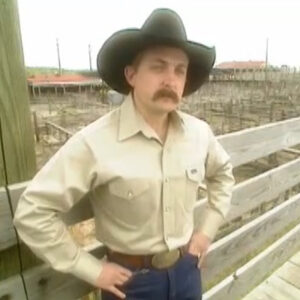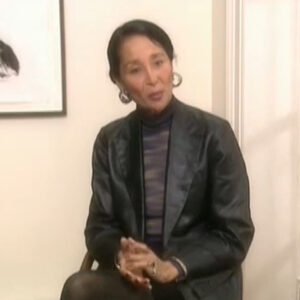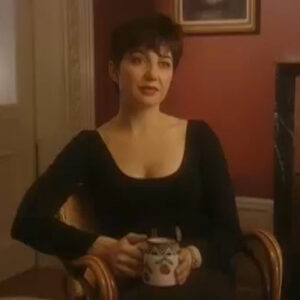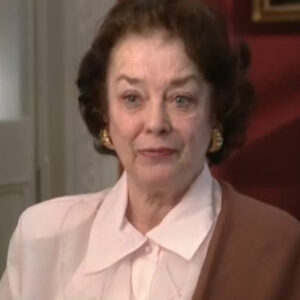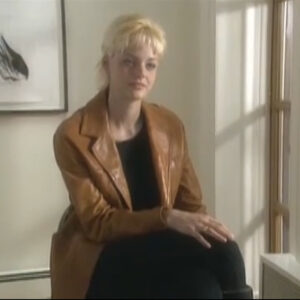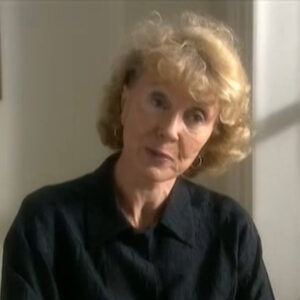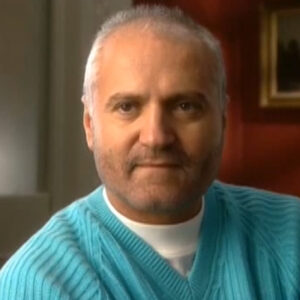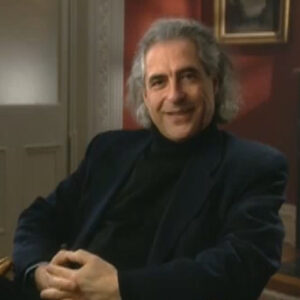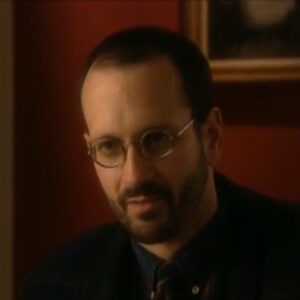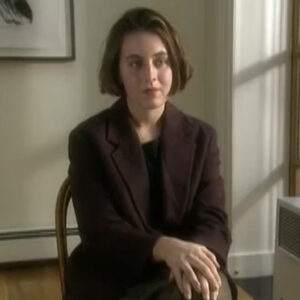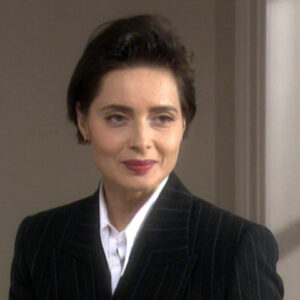Speaker I was proud of his justice system at the time and Dick Broad and his photographs. And we all got that all Radovich and I got very excited about what we saw. And we decided that he should be given a chance to do a fashion setting, which was kind of funny. It turned out to be not a great one for Dick and not great for us. But we really believe that what we saw in the few little photographs that he brought in. And so we pursued it and we kept giving him page after page. And finally he began to really relax and get into the bizarre feeling. And at that time, the magazine was filled almost completely with the wolves. And when and who knows? And a kind of studio atmosphere that we felt was very stultifying. And dick for the nose, excitement of young girls, things out of focus. And so we were quite a good deal together.
Speaker And then at that point, they were offering us junior bizarre as a separate magazine. And at that time, Dick was not really into the the older look. The couture look was still. He was still doing little teenage girls and barefooted and out of focus figures. And we began to plan for Harper’s for Junior Bazaar.
Speaker And we were we were a nucleus of young photographers and young art directors who wanted to break the mold at the time.
Speaker And we used to go out on the beach and walk for hours and plan all kinds of marvelous pages and attitudes.
Speaker And we ended up with what we thought was a marvelous little magazine, which survived only until the end of the war, and it survived only on the fact that nobody had anything to sell. There was no clothing in the market. The manufacturers only wanted their names remembered. And so we were given carte blanche to do anything we wanted.
Speaker And pretty soon, fashion came back to your day started. I mean, the war was over. People had fabric to make clothing with. And so they decided to fold during the bazaar and just work with Harper’s Bazaar.
Speaker And it was at that time that Dick was fairly well established.
Speaker We had broken that barrier and he was going off to Paris to do a collection. And I very much want to be a photographer. I had the bazaar, I had the art directing, and I had a feeling that there was something in me that had to be said with the camera. And Dick, who was always very generous to young people and maybe not even just young people, very generous about getting their profession started and getting them known and so on. And he said, listen, I’m going off to Paris for two months. The studio is empty. I’m paying my assistant. Why don’t you go in and see what you can do? So for two months, I practiced a perfect really. But at the end of the two months, I had a great big campaign. And I think that’s one of the things that I admire most about that. I mean, aside from his photography, is his generosity to other people within the profession. There are nameless people. I don’t think all of us would have made the huge imprint on photography if it hadn’t been for Dick. Always pushing and developing her reputation. I think the thing is, I don’t know how many others there were in the past couple of years is whopping 10.
Speaker Is that his name or something? And I think it’s a marvelous quality.
Speaker I think that the his desire to teach is part of that of trying to find and help other photographers.
Speaker Fashion.
Speaker Wonderful. I mean, I just go back to your competition, wonderful way, so much to go back to that very beginning with brought up with a bit of a description about what it was like and what a sort of exciting and terrifying mentor he could be. And at that moment that you looked at these pictures and what intrigued you about. Just that moment of discovery. Back it up. Give us again a little bit of the background you were working with brought up there. Was what kind of a mentor he was and made the discovery, the beginning of those first pictures of what he called.
Speaker How to describe which?
Speaker He was oh, OK. Yeah.
Speaker He was the art director working with Mukhin.
Speaker I had started out I had started out as a as an art student, a painter.
Speaker And Susan and I decided that I had to eat and as a painter and not a very good painter at that time. This was not going to work.
Speaker And the thing that was closest to me was the ability to draw. And so I thought, well, fashion illustration, I guess, is what it is. And somebody and this was not within my world at all. I never even knew there was Harper’s Bazaar. I didn’t know anything about that end of the world. I was brought up in the village. And anything beyond 14th Street just didn’t exist. And but somebody said, bring them to BroadVision. So I did.
Speaker I stormed the store. And Mr. Private came out a very dower character. And he said all of the drawings are powerful.
Speaker But you know nothing about fashion. Come to my class. And so I came to his class. He gave me a scholarship because, as I said, I didn’t have any money.
Speaker And.
Speaker There I discovered a man who never said the same thing twice. I mean, what was wonderful today was terrible tomorrow so that you always were in a state of flux. You never knew. Did I do the right thing? I do the wrong thing. Did I intrigue him at all? And his expression, the expression on his face never changed.
Speaker It was always very sort of sour and sour and quite a good looking man, but very formidable. And his. And his speech and very withdrawn and his body so that you really never knew quite where you were. And at the end of my stint with being a student, which was the end of the year, the prize for being the best student was that you became part of Bridge’s Apprentice, which meant that you worked at Harper’s Bazaar for no money for a period of two years, two months or so, which is great, great training. I mean. He had an incredible eye. Not that he could ever express what he saw or what he didn’t see, but his taste was infallible. It was really. And, of course, the layouts were his. The sense of white space and the choice of photograph and the type and all of that was very important to him. But if you were expecting direction, forget it. You only knew whether today it was acceptable or not acceptable. You never got to know why or how, but within his ability to push you. You got there? I don’t know, I don’t think anybody knows specifically how they achieved under his guidance or how they didn’t, except that in some way he instilled that kind of feeling of never, ever being satisfied with what you’ve done, what you did today. It’s OK. But I expect the moon from you tomorrow. And so it was a. In order to work with them, you had to constantly be experimenting, changing, looking at things differently, and if you were lucky, he would OK. And if you weren’t you, you wouldn’t know exactly why, but you’d know that this was not acceptable. But I think. His internal need to be constantly stimulated visually is what he. I think projected to the students that they got that kind of feeling like I know that with myself after, you know, every time I had an assignment. After two or three of them, I would have to experiment and bring the experiment into him and he would say, yes, go ahead with that. And so to this day, I don’t think I’ve stayed with the project for more than two or three years without feeling that something new is expected of me, some new way of looking or feeling or sensing or.
Speaker And.
Speaker Actually, when Dick came to the bazaar with his photographs. We were in a position where we were both proud of myself, felt. I can’t stand these studio photographs anymore, can’t stand the girl standing like, you know, beautiful but untouchable, unfeeling.
Speaker And Dick came in with these little snapshots of whatever they were, maybe not snapshots, but little pictures in which you could see that beyond what was happening in front of him. There was something happening behind that was not clearly in focus, but gave the whole mood to the photograph and private.
Speaker And I both jumped on it and said, yeah, this is somebody who we can see as something happening in some new kind of expression. And that was the beginning. And it just went on and on and on and on. He’s still experimenting. He’s still changing. And it’s that kind of thing that that started with proud of it. And I think for those who who followed him, you know, who followed his concepts, it’s remain the same. Let’s not stay with this today. Let’s go on and see how we can excite somebody tomorrow.
Speaker If you were to be speaker, I guess this effort. Is this the influence of Radovich on Dick?
Speaker Experimentation, what other what other ways could you see that? Really?
Speaker Well, I think it was. Yeah.
Speaker I think that what stimulated Dick at that point was the fact that somebody could see within his photographs. Something that no one else had seen before.
Speaker I think that the. The Hmong cochi running pictures. We all had experienced. But at that point. Dick was throwing things out of focus, and I had a little to do with his own my up. He saw things that way. He saw things through the lens.
Speaker By not closing down the lines, he could see these out of focus shapes that were really exciting and really gave us the spirit of the clothing, gave the spirit of the girl. You know, he started out with junior models and what happened beyond what the first mile doing with a whole world of activity that most people would ignore. But Dick was intrigued by these actions and also able to enhance the mood of the front girl with what was happening in the back. And it came at a time at Harper’s Bazaar. As I say, Wolf was in the studio of an ITN camera closed down to F 30 to one. You know, everything became sharp. It was not as if, you know, you fall in love with the girl in front of you and then behind her. Something is happening also.
Speaker And that balances and to the forefinger and.
Speaker It’s not he didn’t use it very much later on. I mean, as time went on, as we all did, things would change and his vision would change. But very often you get the feeling of the whole world being part of this photograph, whether it’s and by being slightly out of focus, which is, you know, you’ve got to remember that broad of the early ballet book in which he utilized all these out of focus figures and things.
Speaker And so it was an influence as much as and influences.
Speaker When Cochi had on him, there were many elements coming in to being within DECT at that time that.
Speaker That existed four and separate ways for other people. But it all sort of gelled in the way that Dick presented it. And also, Dick had a fabulous sense of fashion and style and the kind of woman that was being projected at the time, which was different than what Vogue was showing you or what Harper’s Bazaar was showing.
Speaker And it was like a little minor revolution. Certainly not minor in the fashion world, but maybe they minor only in the world in general, but in the fashion world.
Speaker It was a complete reversal of what they had been doing. And since he did it so well, it was acceptable. I mean, if he didn’t have the kind of sense of of the woman that he had, it might not have happened.
Speaker But all these various elements made it possible for him to really, really take over the bazaar and change their image completely.
Speaker You talked a little bit about this is great. Just about that reversal in that same way after the war, saying a woman without her will be different kinds of.
Speaker Saw that and do it for the publicity. Talk a little bit about that as a mother revolution.
Speaker Is it in your own photography?
Speaker Away from the statue’s right.
Speaker Well, it was you know, Dick came to us towards the end of the war and with the end of the war came a whole revolution in fashion design of. Now, there was fabric. Now there were women going to work. And we had all participate in the in the war effort. Women were working in factories. Women were no longer only housewives. They were part of a whole new workforce. And with this new workforce came new concepts of clothing. Easy, easy to walk, easy to ride, easy to get into the bus and to striding flat shoes became much more part of the fashion world. The American designers finally came into their own with Claire MacArdle and people like her were. Clothing women for the American scene and. I think if you watch or at that time watched women walking in high heels, they were really mensing. They weren’t walking. And now suddenly people were striding. There was a whole kind of uplift of movement and. And this sense of movement was tremendous. He always was able to and and made it his point to photograph women on the up movement, not when they’re coming down and to a plea.
Speaker It is.
Speaker So that he changed the look of. Of photography. As part of a changing world. I mean, it wasn’t as if he dreamt this up in his own head. He was responding to the needs of people at that time.
Speaker And.
Speaker That’s what we saw on deck away, as opposed to the people who were used to photographing beautiful women who had no relationship really to the kind of life that was being led at the time. They were beautiful. They were composed. They were created. They were in the studio. They were on feelingly errantly suited me, you know, and all that went on outside the studio. They weren’t. And with the blaring taxis and the kind of.
Speaker Of action that was taking place on the streets. And this is what brought up, which was mostly interested in street activity. Life. What’s going on in the world? What’s happening with the signs, with the lights blaring into the camera? The movement without stopping the movement so that you got a feeling of things rushing and moving along? And Dick was one. I mean, there were other photographers, true. Who were able to express that. But he had a good combination because he also knew how to photograph fashion so that it worked very well for Harper’s Bazaar. I mean, there were great photographers out there feeling what Dick felt. But who didn’t have his sense of the people that that Harper’s Bazaar was interested in selling to?
Speaker It’s really difficult for me to to talk about Dick’s relationship to a model since I wasn’t on the scene with him at that point. I know that he had very intense feelings about a lot of it, and I think that every photographer at some point the other falls in love. I don’t mean sexually, but falls in love with their model. I mean, I don’t know of a photographer who hasn’t had a relationship with a specific model. I’m a pinhead with Liza and with another. I can’t think of Model’s name. Dick had it with several photographers. I mean, several models. I had with several on my own where you find somebody who was completely sympathetic to the way you think. And somebody who you can sort of develop as your own model.
Speaker I know that one day Bob Ramone walked into my studio and it was Christmas Day and I just wanted to get out and go away and forget about the whole thing. And I was supposed to go to Paris right after Christmas.
Speaker And the model that I was using that I had loved came in with the Wolf Posen. She had spent two months working with the wolf.
Speaker And all I was getting were were not them, not the reaction I used to get from her. But she was carrying over her experience with golf. And I said, I can’t take this girl to Paris and possible.
Speaker And at that time, Barbara walked in and she was the homeliest Draghi is looking character. You were saying she came something like Hammil. And I said to the editor, how could you bring this girl in on Christmas Day? It’s impossible. Said.
Speaker Never mind. Well, I turn the lights on and suddenly this girl just became a flower. I mean, I’ve never seen anybody unfold like this. She had a six foot long neck and everything was more of us. And immediately we began, we understood each other completely. I would just have to say two words to her, not go through all the machinations that you do with most models.
Speaker And so you developed. I took her to Paris and we had a wonderful session together. And I used to constantly. She never really, really worked. Dick, maybe just rarely.
Speaker I mean, we all had people that we sort of developed on our own. They became ours. The people had problems with them. I think that’s what happened with Susie Parker, too. They could become so much a part of her and she a part of him that if you sent her off to another photographer, you say, oh, well, I don’t want to Gavin on pose. I want mine, you know? So.
Speaker I I’ve gotten lost.
Speaker Well, uh, joking about how you work with the model. What kind of feeling you try to get a vote from them.
Speaker Dick would at that point was interested in motion and action. And as you know, and his personality is always up, up, up. Let’s move, let’s go up and up and up. And it’s always. And he himself is always moving and and gesturing. And so and the models respond to that. I, on the other hand, always photograph the girls as their movement was coming down.
Speaker To me, it was a kind of sensual female kind of action. I was very interested in women as. Not not that they were working women because we were all working women, but that had a much gentler kind of attitude about themselves and the people around them. And I know, for instance, I was just asked to photograph fashion for Vogue in France. And I thought, I can’t get into all that up front kind of sexuality.
Speaker Let’s knock them dead with our breasts and our hips and our vaginas. Let’s you know, to me, it’s it’s really in your face kind of sex. And my kind of sex was always kind of internalized. And so that the movements with us were quite different than this, which was always very exuberant, very you know, it was his personality. And he still bounces around, you know, running and jumping and being up up there.
Speaker And so I think that I say it goes with the heartbeat.
Speaker It’s his beat is up. It’s low and slow.
Speaker Wonderful characters.
Speaker Were I at that point, the early part that I’m talking about. I don’t think Diana Vreeland was too involved. Meechie when Dick went to to Vogue. Yes. But at that point, Raelynn was very involved with wolf settings. And I don’t know how often she went out with him more.
Speaker And actually, Vreeland was best within her own little milieu in the studio where she would make up marvelous words and marvelous phrases and really make you feel what that clothing did, how it did or what the color did.
Speaker And she had the most and sensational kind of speech, which unfortunately never, ever seemed to come out. And a transcript of any kind. She was terrible on radio. She was terrible on television. But really a brilliant kind of magnet for the kind of work that she wanted from you. Mrs. Snow had impeccable taste. I mean, she she really appreciates.
Speaker Oh.
Speaker And Mrs. Snow, who was the editor in chief, was herself a very straight laced little Irish woman with the most incredible kind of sensibility about what was going on, who to trust and how to trust. She the.
Speaker I don’t know how much she read if she read very much, but she had a great literary agent of editor who really found people like Truman Capote. And on and on and on.
Speaker She was a great executive.
Speaker I mean, she she hired the best and went with the best, understood it, even though she herself could never create it. And she was the one who brought brought it to Harper’s Bazaar when no one knew anything about him so that her sensibilities were really terrific. So I don’t know whether she could ever express it verbally or whether she could ever really find it on her own. But she knew who to trust to find.
Speaker You describe the early years of. Friendship with them with the four. For being a out. But that was my it was like to be a friend of Dick’s.
Speaker One couple talking about the that and how we met. We really met on the job. We were working for the bazaar and it was at the time that Mrs. Snow asked me to develop Junior Bazaar, which I started to do and proud of, which came in on.
Speaker And, uh, we gathered around us or I did the young photographers at the time, uh, people like we for Bob Frank, for him or my husband, uh, take and take.
Speaker And I hardly knew each other.
Speaker We just knew each other from work. And, uh, I was offered a house on fire. And it was I just said to Dick, Would you like to join us? Paul and I are going out to look at this house for another metric, you know? And, uh, we went out, um, signed the lease. This place. And we all became as close as any four people could be. It was when he was married to DOE and they were too charming children. We were older than they were and much more sophisticated. We knew our way around firearms. Which was a real eye opener for Dick Andoh.
Speaker And from that day on, for the next 15 years, I think it was or at least the next three years, we spent every day together. I mean, we would during a week, we would have dinner together. We would make our food together. And all the time, talking, photography, planning, working out. Uh. A way of doing six pages, the junior bizarre and. Dancing barefoot every night and swimming at 2:00 or 3:00 in the morning and doing what most young hippies do. Drinking, eating and.
Speaker That was the beginning. And then, as I say, it came time when we were a little bored with my round and Dick was doing the his first collection in Paris. And so we made an arrangement to buy a car. No, that was the first trip we went to Rome and we hired a car and a driver and we went through Italy.
Speaker And then that was with dough. And then when they got divorced after one or two years, we went off to Yugoslavia together again. Dick was doing the collection and we met.
Speaker At a certain night, we first we went to Yugoslavia. Then he went back to do the collection and then we met in Spain again after that. Well, have you ever seen the movie Sabrina Schiff, though, was the daughter of a caretaker. A very feisty, bright, charming girl who had no no use really for the fashion world. I mean, not in the sense that the fashion was at the time. If she wanted to cut her hair, then chop, you know, get the pieces. She was a wonderful guy. I mean, uh, playful, always. Laughing Oh, I guess not not towards the end of their relationship. I think that things got a little twitchy and Dick was determined to become an actress. I think it was more his choice than hers. But she went off to, uh, Martha’s Vineyard and, uh, it was the end of their relationship. Well, she she, uh, became involved with a young actor who was the exact opposite of Dick.
Speaker Untutored, uncultured, handsome.
Speaker Vile, a vile in the sense that he was, uh, I think a very sadistic kind of guy.
Speaker And I could never I guess it was the complete opposite of Dick who was sensitive, very knowing, very wise, and even though he didn’t go to college, he was completely an everyday kind of person and still there. Their marriage ended.
Speaker I’m sure it was. Um, uh.
Speaker I don’t think he quite understood what was going on or why it was happening, but, uh, who knows what you know what what Dick was a dick was, uh, going through his first brush with psychiatry, I guess, psychoanalysis and, uh, finding out a lot of things about himself. I’m sure. And maybe didn’t quite work, but though she was quite another kind of entity at that time. And, uh.
Speaker There was really still very childlike and her desire to have life.
Speaker You know, the fun games and maybe it was moving on and whatever. She was the exact opposite of that one. Everyone was a reader. An intellectual, a very reserved, physically aware Joe Watson, you know, on, uh.
Speaker So he found two very different women.
Speaker Yeah.
Speaker Well, as I said before, Dick and his generosity was, uh, I was being given my first trip to Paris in those days, you know, the the the collections were the, you know, the prize for the photographer for all time. And it was my first collection. And Dick arranged this huge party for me. Everybody was invited. And they had a great big roll of paper. Uh, no seen people coming down. Everybody had a draw on, uh, my remarks and everything. And, uh, at that time, Paul was working out of another photographer’s studio and everyone had been the secretary for a very short time, maybe three or four weeks. And Paul, uh, said, we’re going this party for Lillian. Would you like to come? And she came. Never left. Uh, I don’t think they ever parted at that point. After that night, uh. I know that my model that I was taking to Paris, uh, Barbara Mullen, thought that was wildly in love with her. You know, this kind of exuberance, you know. And I kept saying, Barbara, no, you know, and when he would call me in Paris to cheer me up, you know, cheer me on.
Speaker You’re doing great, lawyer. Nice little contact, you know.
Speaker And she would say he calls me. No, we didn’t. But, uh, anyway, we brought Ellen to that party and she sat in the corner. I don’t know how they ever got together. She sat in a corner, sort of not talking to anybody, not being part of the group, not involved in all the gaiety that was going on.
Speaker Dick found her in that corner and they stayed together.
Speaker And, uh, eventually, uh, they got married. I don’t remember the wedding. Well, we never got you know, we were never involved in that kind of thing. But they did. They they really never separated after that, I guess, until things. Didn’t work out in their relationship.
Speaker Well, uh, Paul and I are very our almost the opposite of, uh.
Speaker We neither of us like celebrities or maybe we’re too shy to be part of the celebrity world. There are all kinds of theories about this. I mean, one is that you do it by choice and the other is that you’re not accepted. I don’t know where we fit in, but, uh, neither one of us were ever really impressed with celebrity. And we found it very or Jack found it difficult to be with us when he wanted that kind of life. And we didn’t. And, uh, we made it rather difficult for him when he was with us to take part of this. I mean, I remember one weekend and when we had a house together in West Hampton and he had invited, uh, well, one of the big actors and, uh, Paul not Paul Bradley couldn’t stand him. He thought he was being very narcissistic and self-involved. And, uh, they were everybody was drinking and all uncomfortable. And I took of this actor off to Montgomery Clift off the to the beach. And, uh. So but as time went on and Dick got more and more successful with that world and wanted much more of that, then we were interested in at that point. I was having a child and we got all involved being working people. And I being a working mother, found it impossible to go out to dinner. I mean, my my life was from, say, nine to seven involved in work. I would come home and watch the children, um, you pay them and feed them and spend time with them. It was the only time I had so that we were not eager to go out to these dinners. And these boys, we didn’t need them. We were so involved with our children and involved with their development. And I think maybe if we were not working, we would have done more of it. But since we were so that Dick at that time was not involved in having a child. So they were having a social life and we were having our life with the children. Weekends we would spend with the kids. And so I guess socially we redress it. We were very happy, but we were not being what he was, you know, living the kind of life that he let up until that point. So we had the children. We dined out every night, had parties every weekend we were available. But life changed and our relationship to date changed. And as he got more and more successful and got more and more involved with, uh, with celebrity, we got less and less.
Speaker We became virtual recluses. I mean, we had a few friends, uh, but not many. Not not like Dick was having. And we also didn’t miss it. So that’s how a friendship ends. In a way, though, uh, we have tremendous respect for each other. My children certainly respect him. And I thought it was very funny that, uh, when he was having dinner, he invited Eric, who was the.
Speaker Who is an editor at the Abrams books.
Speaker And his wife at that time was working for Variety. So that is still doing his best, you know, for advancing his projects. And we’re not part of it. I’m you know, I have my my own agenda. Paul has his, um.
Speaker There we are.
Speaker You have a. Uh.
Speaker I really I don’t feel that comfortable with him when we meet. I’m sort of sad occasions, I guess, when a mutual friend or when his agent died.
Speaker He’s always warm and exciting. And I always feel like I really can’t live up to this business. And do I trust it really? You know, I think, you know, he’s all embracing and warm as can be and can forget you the next minute.
Speaker I mean, this was true of Radovich, too, you know, you’re the greatest. Today and tomorrow you’re down.
Speaker I don’t know what the dick is, is that I mean, he doesn’t do the down thing, but he does do the blotting out, you know, your. And I guess we’re all like that to a point. How much of my life can I devote to you and how much can you give me in return? I think Dick uses people a great deal. And why not? I can’t fault him for that. But I’m not usable at this point. I mean, I’m of no great importance the way I was as a mentor when we were growing up photographically.
Speaker I understand that, uh.
Speaker I also understand my involvement. My own little family group and.
Speaker And I think my my daughters could good example of, you know, what she got from us. And the, uh, the involvement that we had with her development.
Speaker She’s going to be. Photographer. I mean, she I think she’ll really make a mark. I mean, she’s right now she’s making a living.
Speaker But I think that she’s going to get their. Yeah. Right.
Speaker Would admit it. Well, I guess he would admit to have been an autograph hound when he was growing up. I mean, we all know that he. Of his escapades with others.
Speaker But I think that he talks about well, the only thing that I can tell you.
Speaker I wasn’t present at these. The by the time he you know, he came to us. It was only an anecdote that he repeated about how he would the extraordinary lengths that he would go to climbing through the windows and to get these autographs. But I think that nine tenths of the.
Speaker Dick’s involvement with personalities and doing their photographs is like an autograph hound. I mean, he. It doesn’t really. Or not until he did the Westerner’s, did he really not focus on a celebrity? I mean, butter was a precedent or a or an artist or a dancer or that they all had to be important people. I think that something happened when he went out west and he developed the not another time of thinking, but I do think that all of the the photographs from. From that period when he started the portrait was a kind of collecting of order of autographs.
Speaker Mean, I know that when he photographed Lionel poor polling, this is Linus Pauling.
Speaker That he paid his own way. I mean, he he went to Europe. Nothing stopped him when he wanted to photograph somebody.
Speaker He just, you know, other people would say, I would sit back and wait for my assignment. I think in the same way that he got the autographs, you know, churned heaven and earth to get that that person to sit forum. I mean, so but I think it’s an extension of this desire to have some kind of physical contact, whether it’s a signature or his photograph with the people that either he admired or hated. But that he had some kind of pull towards me. He just didn’t photograph anybody in the streets. You know, there’s always somebody who was a somebody. I mean, at least. As he claims that, you know, that his street photography was the desire to do reportage. I think it was the things that he showed me in his early days was like any any photographer who goes to Europe and who has a fresh eye and a fresh vision would do. But those are not the things that really tugged at him. He I think he looks at them now and thinks that they’re they’re great or that he did a wonderful job. And yes, he did. But I think it was not in the same way that he did. The portraits. The portrait. He. Weren’t set up for him. He went out and got them. What you’re doing reportage on the street. You’re just using your eye critically to get what’s going on. But you’re not creating it, really. But when he did the portraits, I mean, he really went out to get that particular person and shoot them, you know, and interpret them or or misinterpret them, whatever, whatever he was feeling at the time. I think, like with anybody, any. Subject that you choose. Aside from what you can get out of them, they have to have something to give you. All right. You can’t really dig into a person if they’re if they’re not if there’s nothing to get to. And I think that they would look for these people that would.
Speaker Like the ones of.
Speaker Well, Charlie. Charlie Chaplin’s is not my favorite picture, but.
Speaker The.
Speaker The Windsors, for instance. I mean, he made the definitive statement about who these two people were. I don’t know now how they ever permitted it to be published because it really showed them up for the kind of people that were reputedly.
Speaker They are.
Speaker Want to make one statement on that. I just want to make one statement that I don’t believe.
Speaker That a photographer takes a picture. I think the photographer makes the picture.
Speaker And I think that’s what brought it, which instilled in all of us. And I think that Dick very much reacted to that. But.
Speaker Well, that you really are there to control everything in the same way that you control a movie or a series or something, you have to be the director and whatever. I think that Dick directs these photographs. He doesn’t just react to them and take them.
Speaker I think, you know, we can all intellectualize about what we do. I don’t know whether. I think that’s kind of an answer from being, what, a therapist for a long, long time. I don’t know whether that’s true or not. I’m not. No judge of that. I think it’s a matter of control. More than fear. I think. The desire to control and my way of thinking is greater than his fear of what’s going on. Well, maybe the. Equal sides of the same picture. I think Dick has a tremendous need to control everything around him, and I think he does.
Speaker You tell us that you love.
Speaker Well, you know.
Speaker At that point, when I first met him, he was always wearing eyeglasses so that you never got the the intensity of what was going on behind him.
Speaker But I would at the shore.
Speaker He didn’t wears glasses. I have a picture of him, as I said, just, you know, zooming out at you. And drawing you in. They really were beautiful, beautiful eyes and sort of took over his whole expression and his whole face. And I think the important thing is with Dick is that he sees, you know, the eyes are very important.
Speaker It’s part of his.
Speaker His makeup. You know, it’s what he sees that he’s photographing and muddy. You know, I don’t know how much of what he feels, but certainly it’s what he what he projects with what his eyes do.
Speaker That I feel is important. And he does have you know, now he I’m sure that there are times when he wears contacts.
Speaker I don’t know how much sensitivity you can get from looking at a person’s eyes when they have contact. But at that point, I mean, his whole expression seemed to be in that section and was quite extraordinary.
Speaker But this is what his profession demanded of him was the ability to see.
Speaker We’ll be showing a number of portraits made of.
Speaker Well, I, I always whenever I see that picture portrait of Dick, I start to laugh because I feel that pen is giving back something to Dick that Dick does to every other photographer.
Speaker He’s not making the beautiful.
Speaker Kind of image that you could get out of the keys sort of doing a tech version of what the tech does.
Speaker And I don’t know whether Ken was conscious of this or not, but it took of made people look beautiful and wonderful. And this is not the most flattering picture of Dick.
Speaker It looks like a very tired, worn out.
Speaker Sort of. Over the hill.
Speaker Person, which Dick is not. I mean, it’s certainly not all of this effervescence and ability to charm. There’s nothing charming about that photograph. And Dickens a very charming person.
Speaker So that. But then. The photographs that Dick has done of great beauties and have destroyed that beauty is very much appended to Dick.
Speaker I think that would take would really like to learn. It’s not what I think, will. I think that they brought a tremendous change in the fashion world of photography and that he has influenced innumerable photographers and that they’re quite beautiful. I think that his portraits will last. I don’t feel that.
Speaker His reportage that. The reporting and the and the insane asylum have anything to do with. I think it’s Dick wanting to show a side of him that really is not successful as far as I’m concerned, anyway, that he wants to be accepted on a level that he feels is demeaning.
Speaker I think the fashion photography, like any great painting, whether it’s a part of Chelsea or a sergeant or whatever it is, they’re all part and parcel of fashion to some extent or at least fashion is used in them of both male and female of some of our greatest portraits. And that verdict to really play down his fashion is a mistake. I think that he doesn’t recognize it for being anything but fluff. And it’s not fluff. It’s a presentation of a period of a lifestyle of a. Of what’s going on? I think. Maybe not the fashion models, but when you use these society women, he really reflected a whole world of that society. And.
Speaker I think.
Speaker It’s kind of like I never believed his story about his sister and that he’s looking for a sister, I think these are all afterthoughts that don’t really ring true to me. But that without his censorship of his own work, that there are parts of it that I feel will, you know, last and last in life, you know, they’re.
Speaker Who’s to say that a sergeant is anything but a wonderful looking woman in a black gown? You know? She represents the whole period in society. And.
Speaker I think he’s making a mistake there. I don’t think that his strength.
Speaker Is that know the kind of reportage that you showed at the beginning of the show when he was young and how we all reacted sensitively to our our, uh. The events that were taking place in front of them. But that’s not where. Where I think he is, his particular strength is.
Speaker I think that the wall section is a very incisive. Representation of what was going on in the art world at that point. And there are many things that I think will last. Unfortunately, not what they swap, at least in my eyes, as I it.
Speaker So. 30, 40 years, years, a lot easier with a lot of unemployment criticism as well.
Speaker Well, I think because. For instance. I think.
Speaker The campaigns that he does for money that he thinks are with a. And sexual.
Speaker Um, uh.
Speaker I think a now. I think it’s it’s true that he’s doing it for money, but really underneath it all the. He wants it to be accepted on a on a higher plane. And. I think for one thing, they’re not as. Creative. As photographs. I think that they’re.
Speaker They’re kind of taking the surface of the sexual release that’s going on at this point. Let’s show what we’ve got. Let’s have a main show, Trois. Let’s go in to kind of never Neverland. What those perfume ads.
Speaker I think.
Speaker True, they’re made to make money and they are terrifically valuable in that sense. And he does make money and I think a lot of people.
Speaker Ah.
Speaker Annoyed by that, in a sense. On the other hand, he shouldn’t claim them as being. Anything but what they are made in the bazaar when he when he was trying to sell a dress. He was really sewing a woman with the dress. I think these are. Choo choo choo.
Speaker Trying to be super sophisticated and may not working. And I think that for many people, they don’t work.
Speaker Pretty unusual. It’s a blast from Robert Frank, whether it’s. Angry that he’s a crossover artist trying to.
Speaker Well, I think it’s because I I think Dick overuses. His ability to. To get. Publicity.
Speaker It’s almost like Madonna. You know, Dick can manipulate the whole world of commerce and. Being oversaturating the beginning of the show, I mean, who else in this world has gotten as many? Interviews. Our programs, half our programs on major networks. And I think they feel that it over shadowed everything that he did. I mean, he just flat out. The whole world with this kind of. Of publicity, and I think that though many people feel that it’s undeserved when it’s that much, you know. If he had sat back and let the world discover him, he may not have gotten that kind of flack or if he had had one or two programs. But with all this power going on, people said, you know, who is he? He’s a photographer. He’s not the president of the United States and the president of the United States. We get as much attention as he got at that point. So that.
Speaker There are many, many people who would be critical of this and show, you know, we’re not taken in by all this hoopla that’s going in. We’re going to be more critical and really give it to him.
Speaker Let them have it. Yes, I think so. Really?
Speaker Go back to one story, I got a note from Karen that there was a plane over.
Speaker You don’t like the the normal sounds.
Speaker Oh, I see. Right. I get.
Speaker Well, I don’t know if I can go through that again.
Speaker Well.
Speaker I was trying to explain that, uh, our social outlooks were very different than decks and, uh, it’s neat to have celebrities around him. And we had a house together. Um, Westhampton. Was everyone. The pull myself and I was nine months pregnant at the time and. Ticket invited Montgomery Clift for the weekend. Everybody was drinking and Montgomery was being very narcissistic and, uh, very VLT Schmidt saying, you know, he was beating his breast really. And the girl who was with him was nowhere. I mean, she she obviously was not a date for him. They were just came up together and, uh, they and the evening ended rather badly.
Speaker And I was I took Montgomery off to the beach to sort of common because by that time, tears were flowing and breast feeding was going on and I became the all encompassing mother.
Speaker And Dick was terribly upset that we had not treated you. I don’t think they want your story.
Speaker Dick was very upset by this whole incident. He felt that we had ruined his or. It ruined his, uh. His relationship to Montgomery and. We sort of. Didn’t see each other very much from that day on. Was the Termine. To make friends with them in the theater world. And he did. And we were determined. As a matter of fact. You know, I was pregnant. I very soon after I gave birth. And our life changed completely. We were no longer partying and drinking and dancing in the same way, at least during the first few years, so that we really went separately at that point.
Speaker I mean, that was the real cut off emotionally. When Dick decided that. He wanted the celebrities and we decided they meant nothing to was. So that’s how it went.
Speaker How that fascination with Jaws went flying and why you. Still continue to be.
Speaker I haven’t any idea. I have never felt comfortable.
Speaker Really? In the celebrity world, I.
Speaker I even I get to a certain extent I can accept whatever accolades I’ve gotten, like I just came back from Paris where I was given the oh, Marge, Lily and Basman and the.
Speaker Never really meant very much to me and never really interested me that much. I found the dinners very boring and the whole association. Yes, you’re marvelous. No, you’re not more of us. Didn’t mean anything to me. I never knew what to say after that.
Speaker You know, so, you know, I was just introduced to it in Paris, too. Mrs. Harryman, ambassador to France from America.
Speaker And so what do you say to her? She’s thought a living, breathing person to me. I can appreciate what she did or didn’t do. But then what is the conversation about? It’s always a very light, airy little exchange. I don’t know how much deeper deck goes into these things, but for me there. The fish was wonderful. I don’t know what to where to go after that. So he’s a great actor. It doesn’t mean he’s an interesting person to me. And it has to be more than just, you know, I meet you today and we say three words, too.
Speaker We get to each other and that’s it. What people do creatively doesn’t always make for. An intellectual who can give you something beyond what he does. I mean, yes, be articulate me to be more of us. If he’s not articulate, it’s no fun. And so while I don’t know what to get out of this, I know that I didn’t get it.
Speaker And that’s why our Paul didn’t get it. I didn’t get it. There are people who who glory having dinner with the president. I would think it was the most boring thing in the world. Is was he going to tell me? Is he gonna say anything that’s important? Not to me.

